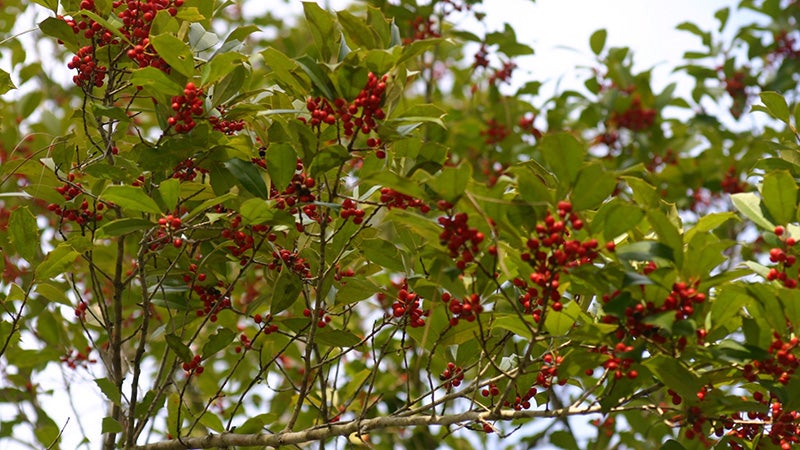The wild plants in your backyard
Published 7:00 am Wednesday, April 10, 2019

- Wood from American holly was favored for carving cooking utensils, such as spoons. Submitted photo
By Patricia R. Drackett, Director and Assistant Extension Professor of Landscape Architecture
The Crosby Arboretum, Mississippi State University Extension Service
Many of the persons residing here in Pearl River County are fortunate to have ample amounts of property compared those living in the Mississippi’s coastal counties. Even our area subdivisions tend to have larger lot sizes, and this means plenty of opportunities for using larger species in the landscape.
For example, few residents in urban subdivisions, where side “yards” may be only five to ten feet wide, would choose to plant a Live Oak tree or a Southern Magnolia, due to their size.
Large properties allow for growing – and enjoying – these larger canopy trees. And, just because you have a larger yard doesn’t mean it will cost more to have it nicely landscaped. Your design can simply include plant material that grows bigger!
Another plus for those with larger properties is the higher chance of having existing natural areas containing native trees and shrubs. These areas can provide habitat for wildlife, or other benefits such as filtering stormwater, functioning as a windbreak, screening views, or reducing your maintenance needs by reducing the size of turf areas.
Existing natural areas can also offer places for you to explore and to learn about the native species there. In addition to yielding food and habitat for wildlife, native plants can also provide food for humans. What do you know about the wild plants in your own backyard?
Perhaps you have edible species such as mayhaws, huckleberries, or persimmons. Just last week I was told by a homeowner they had purposefully not mowed a large area of a field so they could collect blackberries this year.
Have you ever wondered what a typical day was like for early settlers at a time when people depended on the plants around them for food, shelter, and medicine? Early pioneers that discovered a stand of ripe native blueberries, blackberries, or raspberries surely appreciated their good fortune. We humans have lived with modern comforts for only a very short period of time. For many centuries, the survival of people was critically dependent upon their knowledge of which plants could be used for their benefit.
Knowing the medicinal uses of plants was important. For example, sassafras, found along the Arboretum’s pathways, had numerous uses by many Native American tribes. The root was used for the treatment of measles and scarlet fever, as well as for stomach pain or to treat colds. Made into a powder, sassafras is also known as file, and is used in authentic Creole and Cajun dishes, such as gumbo.
Learn more about the uses of native species this Saturday, April 13 in a program called “Foraging in South Mississippi” with foraging teacher Myles Ray, who will cover the edible and medicinal uses of some of South Mississippi’s rich plant life and the skills for foraging or for survival. The cost is $3 for members and $5 for non-members. Also this Saturday, a children’s Easter Party will be held from 1:00 to 2:30 p.m. Children will enjoy games, door prizes, snacks, goodie bags, and a craft activity. There is no minimum age, as children must be accompanied by an adult. Members’ children $4; non-members’ children $6; no charge for adults.
Teachers and homeschool families will enjoy the Crosby Arboretum’s annual Nature Discovery Day tomorrow, Thursday, April 11, 2019 from 9 AM till 1 PM, with exhibits for PreK-12 students and home school families about native plant and wildlife species, their conservation, and the habitats in which they live. The event features two great presentations this year. See the Arboretum’s Facebook page for a full description of the event, which includes a Raptors of the Region presentation by Sally Farrell of the Wind in My Feathers rehabilitation organization featuring live birds of prey native to our region, and the The Environmental and Education Outreach Mobile Classroom, the 2018 Gulf Guardian Award Winner for Youth Education, presented by the Mississippi Department of Environmental Quality and Bayou Town Productions, a theatrical presentation about water quality and watersheds. Pre-registration is required. Entry fee is $2 per child, but teachers, parents and chaperons are free.
Reservations are requested for programs. To sign up call 601-799-2311. The Crosby Arboretum is located at 370 Ridge Road in Picayune, at I-59 Exit 4, and open Wednesday through Sunday from 9 to 4. Leashed pets are welcome.



